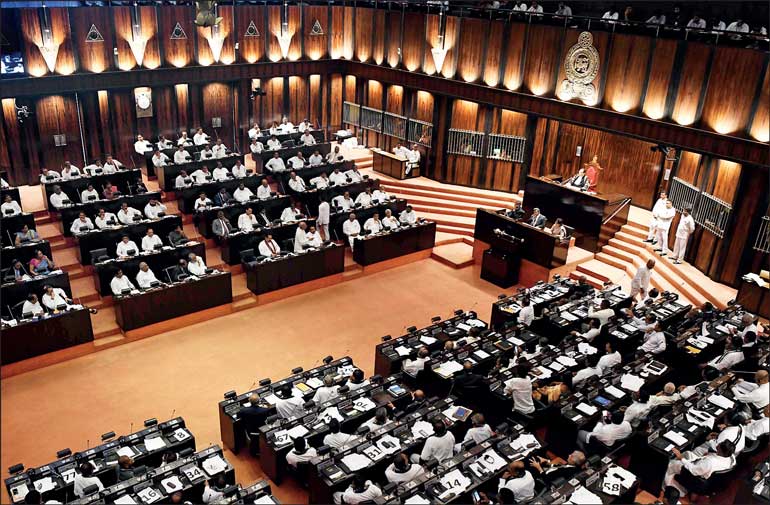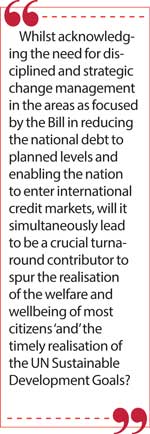Sunday Feb 22, 2026
Sunday Feb 22, 2026
Wednesday, 24 July 2024 00:24 - - {{hitsCtrl.values.hits}}

The enactment of the Bill in its current form, will ‘not’ be capable of delivering consistent and sustainable growth along with the creation of new livelihood options for most of the citizens whilst enhancing their disposable incomes
 This submission is made in the long-term sustainable interests of Sri Lanka and all its people; and sets out some critical aspects to be considered by COPF, prior to proceeding with the enactment of the proposed Economic Transformation Bill:
This submission is made in the long-term sustainable interests of Sri Lanka and all its people; and sets out some critical aspects to be considered by COPF, prior to proceeding with the enactment of the proposed Economic Transformation Bill:
1. Sri Lanka’s best option for inclusive growth requires a mixed bag of reforms to enhance new investments and tradable goods share of growth whilst assuring the bottom 40% of the segment of society have income enhancement for livelihood support,
2. The enactment of the Bill in its current form, will ‘not’ be capable of delivering consistent and sustainable growth along with the creation of new livelihood options for most of the citizens whilst enhancing their disposable incomes! This segment of society is currently drastically impacted by cost of living, hunger, malnutrition, and lack opportunities for human development. This failure is in the context of a severe shortage in meeting market needs for a supportive skilled workforce, and an effectively connected efficient national growth facilitative infrastructure.
3. Whilst acknowledging the need for disciplined and strategic change management in the areas as focused by the Bill in reducing the national debt to planned levels and enabling the nation to enter international credit markets, will it simultaneously lead to be a crucial turnaround contributor to spur the realisation of the welfare and wellbeing of most citizens ‘and’ the timely realisation of the UN Sustainable Development Goals?
4. The key challenges ahead to be focused by COPF in reviewing the Bill are:
The critical negative impact on currently BOI registered positive value adding enterprises enabled to enjoy the contractual obligations only via a transitionary provision of this Bill. Will this lead to externally raised compensation claims under MIGA or other investment protection treaty rights of investors?
The significant risks that upon one or many of the macroeconomic targets of this bill not being met or any commitments and delivery commitment of many new Economic Zones not being met will lead to externally raised compensation claims under MIGA or other investment protection treaty rights of investors?
The current consumer protection framework being near zero in enforcement and without effective legal reforms bringing in effective protection supported by
 Chapter 11 type facilitations
Chapter 11 type facilitations
Anti-Competition Laws
Anti-Trust Laws
Desired economic transformation will not be realised
4. The desired economic transformation objectives will not be realised without effective and acceptable trade facilitation exceeding the WTO minimum standards exceeded in other competing Asian states, highly capable and committed trade negotiators and effective economic diplomacy, and linkages/penetration into linkages all key international trade chambers and especially linkages to supply chains of emerging competitive production destinations
5. Critically question whether the five new public institutions proposed to be established can be avoided by effective restructure, change management, infusion of new talent, skills, and professionalism and using existing institutions where necessary with amalgamations and change of objectives and accountabilities. For example, will a restructured Board of Investments be an option? Can an amalgamation of the Institute of Policy Studies/Institute of Fundamental Studies and Lakshman Kadirgamar Institute replace the planned research Institute and can an amalgamated SLINTEC/CISIR/Industrial Development Board/Other Key Research Institutes not be the vehicles to implement the provisions of the Bill?
6. Consider the value of incorporating the following additions, amendments to the Bill:
1. Add under the preamble
“And Whereas Governance Diagnostic Assessment of the International Monetary Fund conducted during March 2023 focused on corruption vulnerabilities and governance weaknesses linked to corruption in macro-economically critical priority areas of:
(i) the anti-corruption, anti-money laundering and combating the financing of terrorism.
(ii) fiscal governance (e.g., public financial management, tax policy and revenue administration, state enterprise management, and public procurement);
(iii) central bank governance.
(iv) financial sector oversight; and (v) enforcement of contract and protection of property rights and concluded that confronting corruption in Sri Lanka effectively requires short-term actions to address core vulnerabilities combined with more long-term actions to introduce structural changes in governance and accountability that address the underlying governance weaknesses and dismantling current protections that afford officials immunity for their actions is fundamental to achieving and sustaining successes
2. Add under the preamble
Whereas in terms of the Article 28 of the Constitution it is the duty of every person in Sri Lanka–
(a) to uphold and defend the Constitution and the law;
and by
(d) to preserve and protect public property and to combat misuse and waste of public property.
3. Include undersection 2 of the Bill ‘the objects of the National Policy on Economic
Transformation include the following:
4. Add under section 3 (1) National Policy on Economic Transformation to include the following;
Develop Human Resources with requisite knowledge, skills and values and embed essential, efficient and effective systems, procedures, risk management processes, and controls to support identifying niche and emerging growth opportunities and in enhancing productivity and quality of all existing growth contributors
Promote human development, poverty alleviation and environmental sustainability in line with Sustainable Development Goals
Include as a sub paragraph of section 4 – Duty of the Cabinet of Ministers in relation to the National Policy on Economic Transformation
“There should be an option for any future government or any government in an interim period of the five years as stated in section 5 , due to emerging improved or alternative policies/policy priorities, global and local exigencies, or due to emerging fundamental macro-economic challenges and stability risks to amend commitments, policies and priorities set out in sections 3 and 4 above supported by acceptable long term economic and social justifications, with the agreement of not less than 50% of the number of members in parliament”
6. Introduce a clause whereby any regulations promulgated in terms of this enactment, all of which should be tabled in Parliament within a reasonable period from issue, for review by the COPF and with such Committee’s comments and Budget Office Critique be placed before Parliament for noting and where appropriate debate and approval
7. Make the provisions of section 8 – Oversight Control of Parliament to be expanded with the addition of “with the facilitation support of the Budget Office and COPF”
8. Add the under noted overarching section covering applicable institutions and persons connected with the implementation of the provisions whereby
A person exercising powers or performing duties as a member of any board, institution, committee, or advisor ‘shall act in good faith, in the interests of the Commission and shall not act in a manner which is reckless or grossly negligent; and shall exercise the degree of skill and care that may reasonably be expected of a person of his knowledge and experience; and
All Chairmen and Board Members appointed by the President in terms of this Act shall appointed by the President with the recommendations of the Constitutional Council or High Posts Committee of Parliament
9. It is best that Sections dealing with eligibility and registration of foreign investors and investments be
10. Section 36 and 37 dealing with investment guarantees should require that the relevant businesses to be pre-registered with the Commission
11. Section 37(1) should include a process to challenge determinations and for filing objections, further negotiation, and arbitration
12. Need to examine whether section 37(3)(d) need further amplification and clarity to avoid any perceived risks and legal challenges in the future
13. Reference section 38 (1) (a) if retained without an earlier pointed option at the inception of the investments requiring the validation of net incremental national economic and social value addition, may later lead to damaging Sri Lanka’s economic growth opportunities where instances money laundering or the adoption of other unlawful scheme result in net negative socio-economic value generation for Sri Lanka
14. Reference section 38(2) it may be prudent to provide for this process related dispute resolution and arbitration; and further to revisit provisions of section 38 in the context of essential protection if the transactions covered fall within such provisions necessitates raising a Suspicious Activity Report under FIU or other laws relating to Anti-money laundering and terrorism financing; and in such eventuality the potential rights of the authorities for search, freeze and seizure under applicable laws must be recognised
15. The application of the sections 39 (a) and (b) must be subject to a proviso which takes account of any damage, loss or negative impact on socio-economic and environmental damage, if any caused by the investor and its investment
16. Reference section 41 (1) would it not be best if it is extended to require that the investments must promote and advance the economic transformation objectives and be incrementally contribute to enhancing the net socio economic value addition of Sri Lanka; whilst section 41((2) in addition state that any such gratification is an offense subject to penal sanctions
17. It is best that the section 41(5) includes a specific reference to International ESG Standards
18. Reference section 42(b) the regular structured consultation process initiated under former Minister Athulathmudali may be a benchmark for effective value addition and an effective way forward to address any bottle necks clearance and facilitations investors seek
19. Section 44(1) should be supported by a framework requiring compulsory mediation and arbitration prior to any legal action
20. Reference section 45, all exemptions and incentives granted must be time bound and the minister must in submitting the gazette for review by the COPF of the Parliament and adoption thereof, justify such grants by a submission of the national socio-economic net incremental value addition and facilitative of the realisation of the objectives in sections 3 and 4 of this Act
21. All ‘specified institutions’ covered by section 46 (1) recommended by the Minister and prescribed by regulations must be justified by national socio-economic net incremental value addition and facilitative of the realisation of the objectives in sections 3 and 4 of this Act
22. Reference section 47 it is best that the Economic Commission has empowerment to sanction any entity or institution failing to facilitate, if such facilitation refusal or non-compliance is unjustified unreasonable or unacceptable or a perceived deliberate act of sabotage of a legitimate and value adding response action expected from the entity or institution in recognition of its objectives and official accountability vested in the entity or institution.
23. By the addition of a provision within the Act, the Chief Accounting Officer of the Ministry must be required to and be empowered to annually set key performance indicators for the Chairman and members of the governing boards and also the respective chief executive officers of the institutions created by this Act; and to require them to submit their self-evaluation assessments of performance in discharge of their responsibility and accountability under this act and in the realisation of the strategic objectives set for the respective organisations annually.
24. Expand section 55 with an additional subparagraph stating “Specifying Measures, systems, procedures and control to be applied/implemented for Effective Risk Management, and Assurance of Good Governance practices, legal and regulatory Compliance and Internal Control”
25. Ensure that the interpretation of ‘investments’ in section 59 is comprehensive and includes ‘technology transfers, transfer of Trademarks, Trade names, surrender/transfer of quota and other export entitlements/concessions and facilitative linkages with distribution channels and value chain linkages’
26. Reference section ‘Powers of the Zone SL’ be expanded by the inclusion of ‘Management of Waste Disposal, Adherence to Best Practices of ESG Standards, Social Responsibility, assurance of Health and Safety and Risk Mitigation ‘in sub paragraph (q)
27. The Board of Zone SL shall publish Designate Codes of Ethics and Best Practices of governance and the methods for promoting Economic Social and Governance Standards and Social Responsibility Commitments by Operators within the Zones
28. With reference to section 100 dealing with the objectives of the Office of International Trade include the following:
n Liaise with the Ministry of Foreign Affairs and overseas diplomatic missions and proactively promote/engage in economic/trade diplomacy; and develop value adding competitive information and statistics of value and identify niche trade/services opportunities, supply chain links and distribution channels, and marketing opportunities and
nLiaise with the local and foreign Chambers of Commerce and Business Associations in and proactively engage in facilitation of trade, services, transfer of technology and inward and outward investments
29. Reference section 101, dealing with powers, duties and functions of the Office of International trade include;
n identify and facilitate trade, services, and investments and value chain linkages, niche market opportunities, opportunities to promote brand and image enhancement of Sri Lankan origin products, and
n Engage actively in the development of free trade options, quota enhancements and duty waivers for Sri Lankan origin products and facilitate optimisation of national economic benefits from existing free trade agreements
30. A generic provision similar to section 106 to be included to cover all members of any Commission, Company or governing board as well as in the appointment of the Director General or Chief Executive Officer of any of the institutions created by this Act
31. In section 135 (a) dealing with duties and functions of the Productivity Commission include the following:
n sustainable quality, competitiveness deploying technology, best practices, and development of a work ethic built on advanced skills, knowledge, and commitment
n Promoting Change Management advisory services for enhancement of Quality, Productivity with six sigma process improvements
n Development of case studies of successful initiatives enhancing productivity, quality and competitiveness and
nestablish centres of excellence in Innovation and Technology Transformation
n Proactively liaise with universities, academia, and research/science/technology institutions
32. Expand sections 163 (a) and (b) by adding ‘and investments’ at the end.